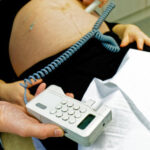Are you wondering “how long should I wait to take a pregnancy test“? Understanding the menstrual cycle is crucial when considering when to take a pregnancy test. The typical length of a menstrual cycle and when ovulation occurs can play a significant role in determining the optimal time for testing.
The menstrual cycle typically lasts around 28 days, although it can vary from person to person. Ovulation, or the release of an egg from the ovaries, usually occurs around day 14 of the cycle. This means that if you have a regular 28-day cycle, you are most likely to ovulate around two weeks after the first day of your period.
Early pregnancy symptoms may start to appear as early as 1-2 weeks after conception. These symptoms can include nausea, breast tenderness, fatigue, and more. Understanding these signs can help determine whether it’s time to take a pregnancy test. Additionally, knowing the typical length of your menstrual cycle and when ovulation occurs can further guide you in deciding when to take the test.
Early Pregnancy Symptoms
Many women wonder about how long should I wait to take a pregnancy test, especially when they start experiencing early pregnancy symptoms. Understanding the signs that may indicate a possible pregnancy is crucial in determining when to take a test.
Early pregnancy symptoms can vary from woman to woman, but some common indicators include missed periods, nausea, breast tenderness, frequent urination, and fatigue. It’s important to note that these symptoms can also be caused by other factors, so it’s essential to consider timing and other factors before taking a pregnancy test.
In general, it is recommended to wait at least one week after a missed period before taking a pregnancy test for the most accurate results. This is because the hormone hCG (human chorionic gonadotropin) which is detected in pregnancy tests typically takes about a week after implantation to reach levels that can be detected. Taking a test too early may result in a false negative, leading to confusion and disappointment.
Factors such as the length of your menstrual cycle and the regularity of your periods can also affect the timing of when you should take a pregnancy test. If you have irregular periods or are unsure about your cycle length, it may be best to wait until at least two weeks after having unprotected sex before taking a test.
Additionally, using an early detection pregnancy test can provide more accurate results earlier than traditional tests, but waiting at least a week after your missed period is still recommended for the most reliable outcome.
Types of Pregnancy Tests
When it comes to taking a pregnancy test, there are several options available on the market. It’s important to understand the different types of pregnancy tests and how they work in order to make an informed decision. Here are the common types of pregnancy tests and how they function:
- Urine Test: This is the most common type of pregnancy test, which involves collecting a urine sample and then using a dipstick or midstream test to detect the presence of human chorionic gonadotropin (hCG), a hormone produced during pregnancy.
- Blood Test: A blood test can also be used to detect hCG in the bloodstream, offering a more accurate result compared to urine tests. There are two types of blood tests: qualitative, which simply detects the presence of hCG, and quantitative, which measures the exact amount of hCG in the blood.
- Home Pregnancy Test Kits: These kits are easily accessible at pharmacies and can be used in the comfort of your own home. They typically include detailed instructions on how to collect a urine sample and perform the test.
It is essential to note that regardless of the type of pregnancy test chosen, it is crucial to read and follow the instructions carefully to ensure accurate results. Additionally, it’s advisable to take multiple tests for confirmation if there is any uncertainty about the initial result.
During this time when you might be wondering “how long should I wait to take a pregnancy test“, it’s important to consider that these tests may differ in terms of when they can accurately detect pregnancy. While some tests can provide results as early as a few days before your missed period, others may require waiting until after your missed period for accurate results.
Ultimately, understanding the differences between these types of pregnancy tests and how they work can help you make an informed decision when it comes time to take a test. No matter which type you choose, always remember that seeking medical advice from a healthcare professional is crucial for further guidance in confirming your pregnancy status.
Timing Considerations
When wondering how long should i wait to take a pregnancy test, it’s important to understand the timing considerations involved. Typically, it is recommended to wait until you have missed your period before taking a pregnancy test. This is because the hormone hCG, which indicates pregnancy, may not be present in detectable levels until after your missed period. Taking a test too early can result in a false negative, leading to unnecessary disappointment and confusion.
In addition to waiting until after a missed period, it is also important to consider the specific instructions for the pregnancy test being used. Some tests may be able to detect lower levels of hCG earlier than others, so reading the packaging and following the instructions carefully is crucial. Factors such as the sensitivity of the test and when ovulation occurred can also impact how early a pregnancy can be detected.
Ultimately, understanding when it is appropriate to take a pregnancy test and why waiting is important can help avoid potential inaccuracies and provide more reliable results. It’s essential to be patient and wait for an appropriate time before taking a test in order to minimize any chance of receiving false information that could lead to unnecessary stress or confusion.
| Timing Considerations | Importance of Waiting |
|---|---|
| Waiting until after a missed period | Avoiding potential false negatives |
| Considering specific test instructions | Understanding how different tests may vary in sensitivity |
| Patiently waiting for accurate results | Minimizing stress and confusion from potential inaccuracies |
Factors Affecting Test Accuracy
Timing is crucial when it comes to taking a pregnancy test. The accuracy of the results can be affected by various factors, so it’s important to understand when the best time to take the test is. Here are some factors that can affect the accuracy of a pregnancy test:
1. Time of Day: The concentration of pregnancy hormone (hCG) in your urine may vary throughout the day. For this reason, it’s recommended to take the test first thing in the morning when your urine is most concentrated.
2. Early Testing: Taking a pregnancy test too early can result in a false negative. It’s best to wait until you’ve missed your period before taking a test, as testing too early may not detect a low level of hCG in your urine.
3. Medications and Medical Conditions: Certain medications and medical conditions can interfere with the accuracy of a pregnancy test. If you’re unsure whether any medications or health issues may affect the results, it’s best to consult with a healthcare professional before taking the test.
It’s important to keep these factors in mind when considering how long you should wait to take a pregnancy test. Waiting for the right time and following the instructions on the pregnancy test can help ensure accurate results and minimize any potential confusion or disappointment.
Ultimately, understanding these factors will help you make an informed decision about when to take a pregnancy test and increase the likelihood of obtaining an accurate result.
Emotional Considerations
Taking a pregnancy test can be an emotionally charged experience for many individuals. Whether you are hoping for a positive result or dreading it, the emotional impact of taking a pregnancy test should not be overlooked. It’s important to be prepared for all possible outcomes and to have a support system in place, regardless of the result.
Hope and Anxiety
The moment leading up to taking a pregnancy test can be filled with both hope and anxiety. For those trying to conceive, the hope of seeing a positive result can feel overwhelming, while the fear of receiving a negative result can bring about feelings of anxiety and disappointment. It’s normal to experience these conflicting emotions, but having coping mechanisms in place can help navigate through this critical time.
Dealing With Unexpected Results
While some may be eager to see a positive pregnancy test, others may find themselves in shock if they receive unexpected results. Whether it’s the joy of an unplanned pregnancy or the shock of an unexpected positive test, the emotional impact can be significant. Being mentally prepared for any outcome – including seeking professional support if needed – is crucial for managing emotions during this time.
The Importance of Support
No matter what result you receive from a pregnancy test, having a support system in place is essential. Whether it’s a partner, friend, or healthcare provider, having someone to talk to about your emotions and concerns can make all the difference. If you find yourself struggling to cope with the emotional impact of taking a pregnancy test, don’t hesitate to reach out for help and support from those around you.
Alternative Methods of Confirmation
When it comes to confirming a pregnancy, there are alternative methods that can be used in addition to a traditional pregnancy test. These methods can provide further confirmation and peace of mind for individuals who may have received an inconclusive result or who want to explore different options for confirmation.
Ultrasound
One alternative method of confirming pregnancy is through an ultrasound. This imaging technique uses high-frequency sound waves to create a picture of the uterus and the developing fetus. An ultrasound can typically confirm a pregnancy as early as 5-6 weeks after the first day of the last menstrual period. It provides visual evidence of a growing embryo or fetus, offering reassurance and additional information beyond what a home pregnancy test can offer.
Blood Test
Another alternative method of confirming pregnancy is through a blood test, specifically a quantitative hCG (human chorionic gonadotropin) test. This type of blood test measures the exact amount of hCG in the bloodstream, which can indicate whether or not a woman is pregnant. Blood tests are more sensitive than urine tests and can detect pregnancy earlier, sometimes as soon as 6-8 days after ovulation. However, they are also more expensive and require a visit to a healthcare provider.
Gynecological Exam
In some cases, confirmation of pregnancy may come through a gynecological exam with a healthcare provider. During this exam, the doctor may perform an internal pelvic exam to assess the size and shape of the uterus, as well as check for other signs of pregnancy such as changes in the cervix or vaginal lining. While not always conclusive on its own, this type of examination can be part of the overall process of confirming pregnancy.
Understanding these alternative methods of confirmation allows individuals to make informed decisions about how they want to proceed in confirming their pregnancy. Each method has its own advantages and considerations, so it’s important to consult with a healthcare professional to determine which option is best for each individual situation.
Next Steps
After taking a pregnancy test, it is important to consider the next steps, regardless of the result. If the test is positive and you are indeed pregnant, it is essential to schedule an appointment with your healthcare provider as soon as possible.
Prenatal care is crucial for both your health and the health of your developing baby. Your healthcare provider can confirm the pregnancy, discuss important prenatal vitamins and screenings, and provide guidance on maintaining a healthy lifestyle throughout your pregnancy.
On the other hand, if the pregnancy test is negative and you were hoping for a positive result, it’s natural to feel disappointed. However, it’s important to take care of yourself emotionally during this time.
Consider reaching out to supportive friends or loved ones to talk about your feelings. If you’ve been trying to conceive for some time without success, it may be beneficial to consult with a fertility specialist who can provide additional insight and options moving forward.
No matter the result of your pregnancy test, taking care of yourself physically and emotionally is essential. Remember that timing considerations play a significant role in determining when it’s appropriate to take a pregnancy test.
By understanding your menstrual cycle and early pregnancy symptoms, you can make an informed decision on when to take a test for accurate results. Always consult with your healthcare provider if you have any concerns or questions regarding taking a pregnancy test or confirming a potential pregnancy.
Frequently Asked Questions
How Soon Will a Pregnancy Test Read Positive?
A pregnancy test can read positive as early as 7-10 days after conception, but for some women, it may take up to two weeks after conception for the test to accurately detect the pregnancy hormone.
Can I Take a Pregnancy Test After 5 Days?
It is possible to take a pregnancy test after 5 days, but it may be too soon for an accurate result. It’s best to wait until closer to when your period is due for the most reliable result.
How Soon After Unprotected Can I Test for Pregnancy?
You can test for pregnancy as soon as a few days after unprotected sex, but it’s important to keep in mind that the likelihood of getting an accurate result increases the closer you are to your expected period start date. Early testing may result in a false negative.

Welcome to my fertility blog. This is a space where I will be sharing my experiences as I navigate through the world of fertility treatments, as well as provide information and resources about fertility and pregnancy.





